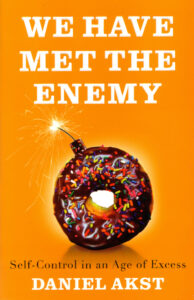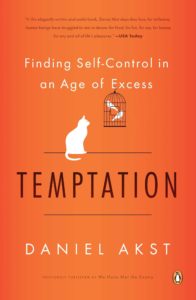
It took me awhile to put together this website, but at least after writing this book I have a better idea why. It’s that old demon akrasia, which was the term the Greeks used for weakness of the will. Yet can a person really act against his own intentions? Or did I actually have different intentions, despite swearing to myself and others that I really would create this website? Perhaps I was just of two minds–but in that case, why did it take so long for the dutiful one to prevail?
The issue, of course, is the conflict between our longer-term aims and our powerful interest in the pleasures of the moment. “Our flesh surrounds us,” says Philip Larkin, “with its own decisions.”

Which is why we have so much trouble with food, alcohol, drugs, gambling, procrastination and the adorable new hire in accounting, who lately has us pocketing our wedding ring every morning. Short-term rewards are awfully powerful, and every time I thought about getting to work on this website, the immediate joys of doing something else reliably intervened. Until just now, they were in the driver’s seat–as usual. It’s a miracle the book got written at all.
The whole thing started with another book that I wrote called St. Burl’s Obituary, a novel that is to my knowledge the only work of fiction in the English language in which the plot turns on stomach-reduction surgery. At the time (back in the 1990s) this was a rare and dangerous procedure. Today there are something like 200,000 a year in this country alone.
Anyway, the central character is a great fat writer of newspaper obituaries who becomes thin by such means, and gets the chance to revisit his life as someone else. As a result of St. Burl, editors started asking me to write about the increasing problem of obesity. Soon enough I’d become interested in the appetites more generally, the management of which seemed to pose such problems for us. The entire thrust of culture in my lifetime has been toward liberation, yet wherever I looked people did not seem to be suffering overmuch from the consequences of suppressed desire. The real problem, it seemed to me, is moderation in the face of freedom and affluence, which is why something like a million Americans die annually from behaviors (over-eating, alcohol abuse, etc.) that they ought to be able to avoid.
And that’s what We Have Met the Enemy is about. It’s an investigation of how we manage (or fail to manage) desire, one in which I glide freely across disciplines as only a practiced dilettante can. Nobody likes a Puritan, John Dewey reminds us, and so I was careful to avoid penning some grimly censorious screed. On the contrary, by the time I was finished I was full of sympathy for those who, from Augustine to Eliot Spitzer, find themselves on the losing end of our never-ending battle with desire. On top of which, the history, psychology, economics and politics of self-control are a lot of fun, and that’s what I had with the book. I hope you will too.
If you haven’t read it yet, see if you have the willpower to resist my impossibly learned (yet unfailingly droll) essay on the same subject in the Wilson Quarterly.